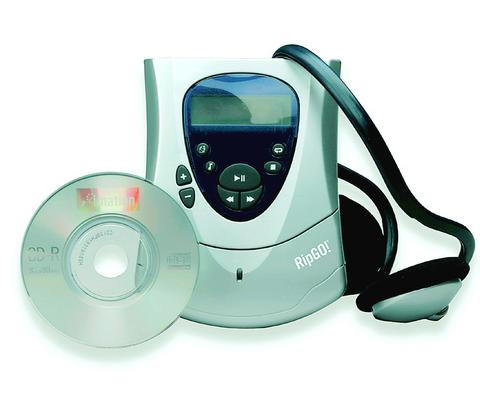If there weren't already enough choices for how best to enjoy music on the go, two major names in data storage electronics, Imation and TEAC, are offering new spins on the mini rewritable compact disc.
Imation has entered the portable digital audio field with RipGO, a pocket-size 227g CD-R burner and audio player. Imation designed the RipGO to use only mini CD-R discs, which are about 7.6cm in diameter, rather than standard discs, which measure almost 12.7cm across. That also reduces capacity, since the disc stores no more than 202Mb, less than a third the amount of a full-size CD-R. But the mini CD-R can store three hours of near-CD-quality music using MP3 compression and up to six hours using Windows Media Audio.

PHOTO: NY TIMES
The RipGO, which costs US$299, requires a USB port to connect to PCs. Moving digital music to the RipGO is no different from burning files to a CD-R.
TEAC's Mini CD/MP3 Player is simply a player. About half the weight of the RipGO, it also uses mini CD-R discs, which are far less costly than chip-based storage media. The TEAC player, which cannot play WMA files, costs about US$129.
The two devices, which were shown last week in New York at TechXNY (previously PC Expo), offer similar playback capabilities, including some skip protection and music-management software.

On Tuesday, US President Donald Trump weighed in on a pressing national issue: The rebranding of a restaurant chain. Last week, Cracker Barrel, a Tennessee company whose nationwide locations lean heavily on a cozy, old-timey aesthetic — “rocking chairs on the porch, a warm fire in the hearth, peg games on the table” — announced it was updating its logo. Uncle Herschel, the man who once appeared next to the letters with a barrel, was gone. It sparked ire on the right, with Donald Trump Jr leading a charge against the rebranding: “WTF is wrong with Cracker Barrel?!” Later, Trump Sr weighed

Taiwan Semiconductor Manufacturing Co (TSMC, 台積電) secured a record 70.2 percent share of the global foundry business in the second quarter, up from 67.6 percent the previous quarter, and continued widening its lead over second-placed Samsung Electronics Co, TrendForce Corp (集邦科技) said on Monday. TSMC posted US$30.24 billion in sales in the April-to-June period, up 18.5 percent from the previous quarter, driven by major smartphone customers entering their ramp-up cycle and robust demand for artificial intelligence chips, laptops and PCs, which boosted wafer shipments and average selling prices, TrendForce said in a report. Samsung’s sales also grew in the second quarter, up

HEADWINDS: Upfront investment is unavoidable in the merger, but cost savings would materialize over time, TS Financial Holding Co president Welch Lin said TS Financial Holding Co (台新新光金控) said it would take about two years before the benefits of its merger with Shin Kong Financial Holding Co (新光金控) become evident, as the group prioritizes the consolidation of its major subsidiaries. “The group’s priority is to complete the consolidation of different subsidiaries,” Welch Lin (林維俊), president of the nation’s fourth-largest financial conglomerate by assets, told reporters during its first earnings briefing since the merger took effect on July 24. The asset management units are scheduled to merge in November, followed by life insurance in January next year and securities operations in April, Lin said. Banking integration,

LOOPHOLES: The move is to end a break that was aiding foreign producers without any similar benefit for US manufacturers, the US Department of Commerce said US President Donald Trump’s administration would make it harder for Samsung Electronics Co and SK Hynix Inc to ship critical equipment to their chipmaking operations in China, dealing a potential blow to the companies’ production in the world’s largest semiconductor market. The US Department of Commerce in a notice published on Friday said that it was revoking waivers for Samsung and SK Hynix to use US technologies in their Chinese operations. The companies had been operating in China under regulations that allow them to import chipmaking equipment without applying for a new license each time. The move would revise what is known